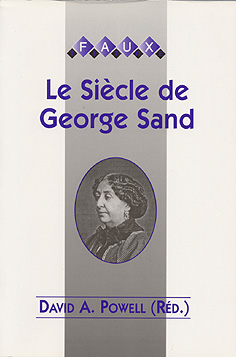David Powell Le siecle de George Sand
| POWELL, David. Le Siècle de George Sand. Amsterdam ; Atlanta : Rodopi, 1998. 373p. : ill. (Faux titre). ISBN 90-420-0473-8 |

|
 |
|
CONTENU :
PRÉSENTATION :
- POWELL, David. Le Siècle de George Sand
ESSAI LIMINAIRE :
- BOWMAN, Franck Paul. The Pleasures and Pitfalls of Reading Literature in a Historical Context
|
|
HISTOIRE, POLITIQUE, SOCIÉTÉ :
- VIERNE, Simone. Politique : le mot et la chose
- BIERMANN, Karlheinrich. George Sand et Victor Hugo : deux visions « parallèles » de la Révolution
- FRAPPIER-MAZUR, Lucienne. Ambiguïtés du politique : la musique populaire dans « Consuelo » et « Les Maîtres sonneurs »
- REA, Annabelle. « La Filleule » : An A-Political Sand ?
- HECQUET, Michèle. Sand : Du socialisme à son abandon
- CHARRON, Sylvie. « Claudie » : Vision prolétaire et féministe ?
- MALKIN, Shira. Between the Bastille and the Madeleine : Sand’s Theater Politics (1832-1848)
- WILKERSON, Tim. « Ton vengeur veille » : La Cause de George Sand at the Théâtre de la République, April 6, 1848
- RICE-DEFOSSE, Mary. The Woman Writer and the Worker : Social Mobility and Solidarity in « La Ville noire »
- BETENSKY, Carolyn. When the People Are Not the People : Populist Paradoxes in Sand and Michelet
- SOURIAN, Eve. George Sand et le coup d’Etat de Louis-Napoléon Bonaparte
- ROGERS, Nancy. « He Said/She Said » in « Horace »
FEMME, FEMININ, FEMINISME
- VAN DIJK, Suzan. George Sand et les mouvements d’émancipation féminine : lectures étrangères
- MINOT, Leslie Ann. « Like a Prostituted Queen » : Refiguring Revolutionary Misogyny in 1830s France
- FERNANDEZ, Cecilia. « La Marquise » : Feminism and Romantic Idealism
- BERTRAND-JENNINGS, Chantal. Déconstruction du genre et intertexte de l’androgyne dans « Gabriel »
- SEYBERT, Gislinde. « Le Dernier amour » and Its Sexual Politics
- HARKNESS, Nigel. Sand, Lamennais et le féminisme : le cas des « Lettres à Marcie »
- WRIGHT, Jacinta. « Une mauvaise copie de Monsieur de Wolmar » : Sand’s Subversion of Rousseau’s Masculinities
- LAPORTE, Dominique. La Figure de l’actrice et la réflexivité du discours romanesque dans « Lucrezia Floriani »
- GARVAL, Michael. Visions of the Great Woman Writer : Imagining George Sand Through Word and Image
- HOOGENBOOM, Hilde. Wladimir Karénine and her Biography of George Sand : One Russian Woman Writer Responds to Sand
- CRUMMY, M. Ione. George Sand and her « Sage-femmes » as an Inspiration for Jules Michelet’s « La Sorcière »
- COCKE, Erika. « Corinne » and « Consuelo » : Women Artists in Dialogue with the World
- CAPASSO, Ruth Carver. The Empress Eugénie in « Malgrétout
CULTURE : ART ET QUESTIONS SOCIALES DU XIXe SIECLE
- GOLDIN, Jeanne. Aurore directeur de conscience
- MCGINNIS, Reginald. Sand and Baudelaire : The Politics of Charity
- MACLEAN, Karen. George and Sigmund Take Tea : « Lélia » Read as a Philosophical Contribution to the Pre-Psychoanalytic Tradition
- MICKELSEN, David J. Building on Sand : From Narrative Zoos to Imagined Communities
- DIAZ, Brigitte. Portrait de l’artiste en maçon : La correspondance entre George Sand et Charles Poncy (1842-1876)
- POWELL, David A. « Music Conducive to Dream » : Sand and the Musical Fantastic
- BAILBÉ, Jean-Marc. Le regard de l’artiste sur la société chez G. Sand
- WALDINGER, Barbara M. George Sand’s Search for the Heart of Faust
- JURGRAU, Thelma. Antisemitism as Revealed in George Sand’s Letters
- GOULD, Evelyn. Sand’s Forgotten Bohemia
- LUKACHER, Maryline. Entre femmes : Sand/Colet et la question de « Lui »
|






